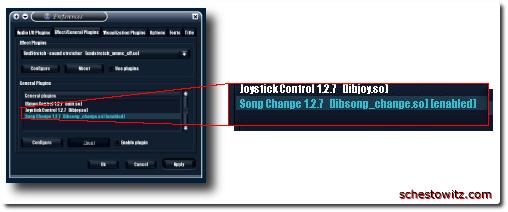Ever wondered how much you listened to a particular song?
XMMS possesses a great extent of flexibility. It provides facilities which, when customised appropriately, can dump complete song descriptions. XMMS can then progressively, accumulatively add song data to log files. Timestamps imply the duration of listening, which lead to possible future extensions, e.g.:
- Automatically parse (scan, hash, then analyse) the log file/s
- Compute an average listening time — that is before skipping to another track — for each individual song
- Erase music that is frequently skipped or just output a ‘prospective deletion list’ to another file
Input/output operations are made quite simple. These can be invoked as command-line strings whenever a new track begins. It is a built-in XMMS plug-in, which can be found under Preferences » Song Change » Configure (see illustration below)

Add the following line to the “Song change” Command field:
(date; echo %s) >> ~/My_playlists/playlist.log
 I am providing an example log file, assembled naturally (not artificially. Honest!) over 20 minutes or so. I still need to get rid of the doubly appearances, apparently caused by
I am providing an example log file, assembled naturally (not artificially. Honest!) over 20 minutes or so. I still need to get rid of the doubly appearances, apparently caused by xmms-kde in my dock (screenshot on the right). As well as giving a minimal user interface, xmms-kde enables control of the player with CTRL+SHIFT+keypad even if the player is neither visible nor in focus.
A music log file results in even more redundant data to store. According to a rough calculations, I will see it growing by 1 megabyte every month or so. Compression, however, should make it only 10-20% of its original size.
UPDATE 26/06/2005: The following command, which can be set to become a nightly cron job, will slice the large log file so that it is composed of daily ‘chunks’:
mv ~/[Path]/playlist.log ~/[Path]/playlist-`date +%Y-%m-%d`.log
This can be extended to form an annual and monthly hierarchy of directories.
See the later extension: producing history spreadsheets

 odern browsers are among the more complex pieces of software in existence. Because browsers are expected to treat similar data (the World Wide Web) and behave consistently, there is plenty of room for bugs to crop up. Big trouble lies ahead if a browser is re-released infrequently or no updates are made available, apart from the critical. This is probably the main catalyst to the “Don’t click on the blue E” campaign.
odern browsers are among the more complex pieces of software in existence. Because browsers are expected to treat similar data (the World Wide Web) and behave consistently, there is plenty of room for bugs to crop up. Big trouble lies ahead if a browser is re-released infrequently or no updates are made available, apart from the critical. This is probably the main catalyst to the “Don’t click on the blue E” campaign.





 Filed under:
Filed under:  t was only a few months ago that my colleague’s forum got hijacked and vandalised, never to come back on-line again. Over the weekend, my host came under a denial of service (DoS) attack because of outdated, non-secure installations of phpBB (not worthy linking to), which proved to be far from reliable. Several sites including mine were suspended for hours in order to avoid another such attack, which brought the server down and crippled it for 40 minutes. I was possibly among the culprits as my phpBB installation was not patched up properly.
t was only a few months ago that my colleague’s forum got hijacked and vandalised, never to come back on-line again. Over the weekend, my host came under a denial of service (DoS) attack because of outdated, non-secure installations of phpBB (not worthy linking to), which proved to be far from reliable. Several sites including mine were suspended for hours in order to avoid another such attack, which brought the server down and crippled it for 40 minutes. I was possibly among the culprits as my phpBB installation was not patched up properly. WordPress 1.5 likewise.
WordPress 1.5 likewise. 
 eeds have definitely revolutionised the way we use the Internet. We can efficiently seek and exploit content without having to undertake laborious navigations in sites. The content is delivered to the user so there is no need to actively obtain it or ever spend time re-reading segments of text.
eeds have definitely revolutionised the way we use the Internet. We can efficiently seek and exploit content without having to undertake laborious navigations in sites. The content is delivered to the user so there is no need to actively obtain it or ever spend time re-reading segments of text. OV-Ray, an Open Source 3-D rendering package that could compete with the commercial Maya,
OV-Ray, an Open Source 3-D rendering package that could compete with the commercial Maya, 

 I am providing
I am providing 
 ne issue is particularly detrimental to OSS: the issue is branching. Implementation takes different directions (often due to third-parties involved) and compatibility begins to break. Linux and its distros are one valid example. Here is an example taken from skinning (AKA themes) to support the argument.
ne issue is particularly detrimental to OSS: the issue is branching. Implementation takes different directions (often due to third-parties involved) and compatibility begins to break. Linux and its distros are one valid example. Here is an example taken from skinning (AKA themes) to support the argument.